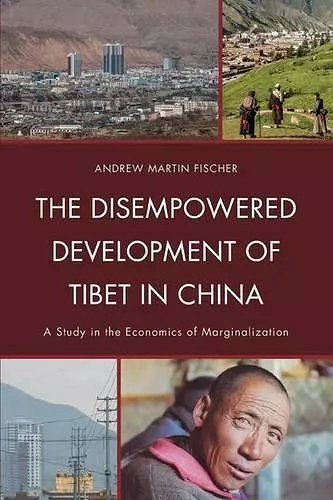The Disempowered Development of Tibet in China
A Study in the Economics of Marginalization
Format:Paperback
Publisher:Lexington Books
Published:20th Dec '13
Currently unavailable, and unfortunately no date known when it will be back

Series: Studies in Modern Tibetan Culture, Lexington Books Weatherhead East Asian Institute, Columbia University Since the central government of China started major campaigns for western development in the mid-1990s, the economies of the Tibetan areas in Western China have grown rapidly and living standards have improved. However, grievances and protests have also intensified, as dramatically evidenced by the protests that spread across most Tibetan areas in spring 2008 and by the more recent wave of self-immolation protests that started in 2011. This book offers a detailed and careful exploration of this synergy between development and conflict in Tibet from the mid-1990s onwards, when rapid economic growth has occurred in tandem with a particularly assimilationist approach of integrating Tibet into China. Fischer argues that the intensified economic integration of Tibet into regional and national development strategies on these assimilationist terms, within a context of continued political disempowerment, and through the massive channeling of subsidies through Han Chinese dominated entities based outside the Tibetan areas, has accentuated various dynamics of subordination and marginalization faced by Tibetans of all social strata. Whether or not these dynamics are intended to be discriminatory, they effectively accentuate the discriminatory, assimilationist and disempowering characteristics of development, even while producing considerable improvements in the material consumption of local Tibetans. In particular, strong cultural, linguistic and political biases intensify ethnically-exclusionary dynamics among middle and upper strata of the Tibetan labor force, which is problematic considering the rapid shift of Tibetans out of agriculture and towards the highly subsidy-dependent sectors of the economy, especially in urban areas. The combination of these disempowering dynamics with the sheer speed of dislocating and disembedding social change provides important insights into recent tensions given that it has accentuated insecurity while restricting the ability of Tibetan communities to adapt in autonomous and self-determined ways. The study represents one of the only macro-level and systemic analyses of its kind in the scholarship on Tibet, based on accessible economic analysis and extensive interdisciplinary fieldwork. It also carries much interest for those interested in China and in the interactions between development, inequality, exclusion and conflict more generally.
Full of fascinating detail and innovative perspectives . . . Fischer’s [book] is a seminal contribution to the literature on Tibet’s development. . . .[This book is] essential reading for anyone interested in Tibet’s current development. * ASIEN:The German Journal on Contemporary Asia *
This fascinating and scholarly book is essential reading for those interested in the economic and political development of Tibet – on which so little is known. But it also has global relevance and deserves a much wider audience, showing how political disempowerment and cultural discrimination can lead to strong political grievances, even in the presence of rapid economic growth and rising incomes. -- Frances Stewart, Professor of Development Economics and Director of the Centre for Research on Inequality, Human Security and Ethnicity (CRISE), University of Oxford
The Disempowered Development of Tibet in China is a comprehensive and powerful account of contemporary economic and social development in Tibet. The book provides a panoramic survey of China’s economic and development polices on the Tibetan plateau using official statistics and fieldwork. The author convincingly argues that rapid economic growth has left the Tibetans marginalized and vulnerable. The book is scholarly, yet readable and it will be indispensable for students of development, activists concerned with neo-liberal globalization and those interested in comtemporary developments in Tibet. -- Tsering Shakya, the President of International Association for Tibetan Studies, University of British Columbia
This is an excellent and important study that anyone interested in understanding modern Sino-Tibetan relations must read! -- Melvyn C. Goldstein, Case Western Reserve University
ISBN: 9780739134382
Dimensions: 226mm x 154mm x 29mm
Weight: 744g
462 pages